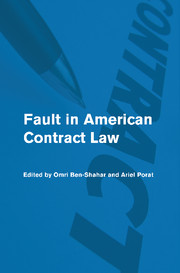Book contents
- Frontmatter
- Contents
- List of Contributors
- Preface
- Acknowledgment
- I THE CASE FOR STRICT LIABILITY
- II THE CASE FOR FAULT
- III BETWEEN STRICT LIABILITY AND FAULT
- 7 Fault at the Contract-Tort Interface
- 8 The Many Faces of Fault in Contract Law: Or How to Do Economics Right, Without Really Trying
- 9 The Productive Tension Between Official and Unofficial Stories of Fault in Contract Law
- IV WILLFUL BREACH
- V COMPARATIVE FAULT
- VI THE MORALITY OF BREACH
- Case Index
- Subject Index
- References
9 - The Productive Tension Between Official and Unofficial Stories of Fault in Contract Law
Published online by Cambridge University Press: 10 November 2010
- Frontmatter
- Contents
- List of Contributors
- Preface
- Acknowledgment
- I THE CASE FOR STRICT LIABILITY
- II THE CASE FOR FAULT
- III BETWEEN STRICT LIABILITY AND FAULT
- 7 Fault at the Contract-Tort Interface
- 8 The Many Faces of Fault in Contract Law: Or How to Do Economics Right, Without Really Trying
- 9 The Productive Tension Between Official and Unofficial Stories of Fault in Contract Law
- IV WILLFUL BREACH
- V COMPARATIVE FAULT
- VI THE MORALITY OF BREACH
- Case Index
- Subject Index
- References
Summary
Most people separate concepts of contract and fault. But that separation is only the official story. An equally true, quieter, and unofficial story traces the path of fault slipping in and out of contract doctrines such as willful breach. While some contract theorists argue for a simple, clear story of strict liability, others discuss the richness that the unofficial story brings to contract law by blurring boundaries between contract and tort, and between private and public realms. This chapter refuses to choose between these alternatives, arguing instead that the official and unofficial stories complement one another, reflecting a productive tension that helps contract law provide both certainty and, when necessary, equity-driven justice.
It is hard to invoke the concepts of “contract” and “fault” in the same sentence, unless you want to echo Justice Holmes's assertion that “the wicked contract-breaker should pay no more in damages than the innocent and the pure in heart.” But that separation of contract and fault is only the official story. An equally true, but quieter, and unofficial story complements the official one. The unofficial story traces the path of fault slipping into contract law through doctrines such as willful breach. Some contract theorists respond to the seeming tension between official and unofficial stories by seeking to impose discipline on their discipline, policing the message to convey a simple, loud, and clear story of strict liability.
- Type
- Chapter
- Information
- Fault in American Contract Law , pp. 132 - 144Publisher: Cambridge University PressPrint publication year: 2010

